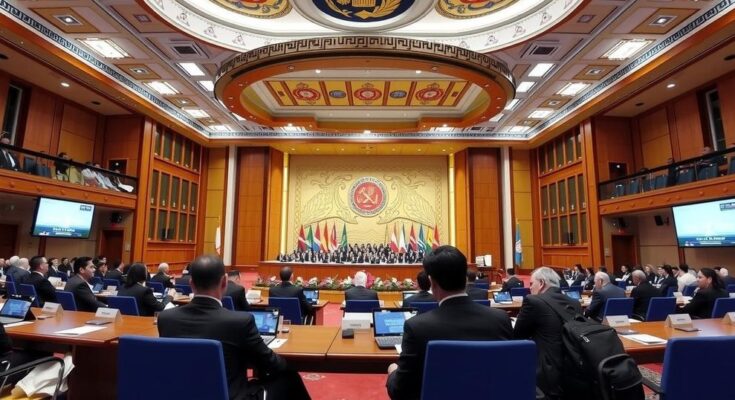The World Uyghur Congress is set to hold its general assembly in Sarajevo, facing unprecedented harassment from the Chinese government. The organization has encountered threats, hacking, and pressure tactics aimed at disrupting the assembly. Despite these challenges, WUC leaders remain dedicated to advocating for the rights and self-determination of Uyghurs, highlighting ongoing repression and the resilience of the community.
In Sarajevo, Bosnia and Herzegovina, the World Uyghur Congress (WUC) is bracing for its eighth general assembly amidst an unprecedented wave of harassment from the Chinese government. The group has experienced threats to halt the assembly, along with physical harm and sabotage attempts. Such aggressive measures have escalated in recent months, aimed at derailing the crucial gathering of Uyghur representatives and supporters from around the globe. Zurmetay Arkin, WUC’s spokesperson, highlighted the severity of the situation, stating, “It’s reached another level this time. The World Uyghur Congress is among the most important organizations in our movement, in the diaspora, and they want to destroy it completely.” A notable incident involved the hacking of a WUC employee’s email account, which spread false information about the assembly’s postponement, further sowing chaos and distrust among attendees. The WUC meets every three years to set new leadership and priorities in advocating for human rights in Xinjiang, where many Uyghurs endure oppression. Arkin stressed the importance of their mission for self-determination, which Beijing perceives as a direct threat. The organization condemns the harassment as an intimidation tactic to suppress Uyghur voices. The Chinese Embassy in Sarajevo has pressured local officials to cancel the assembly and attempted to incite law enforcement against former WUC President Dolkun Isa. However, upon their arrival, there were no incidents reported for Arkin and Isa. Despite China’s attempts at repression, the assembly is proceeding, affirming the resilience of the Uyghur community. Threats have extended to international delegates, including family menace tactics against WUC representatives from various countries, further showcasing China’s reach into global Uyghur advocacy efforts. In Uzbekistan, for instance, local authorities warned delegates against attending the assembly, resulting in their absence. The looming presence of repression reflects Beijing’s consistent efforts to silence dissenting voices. Sophie Richardson, a scholar and human rights advocate, expressed the urgency of these actions, stating, “It’s the ultimate expression of how desperate it [Beijing] is to keep people from talking about genocide and crimes against humanity.” The growing pressure from the Chinese government highlights its denial of rights abuses against Uyghurs in Xinjiang, while the global community continues to seek accountability. As the assembly draws nearer, Arkin remains focused on the safety of WUC members and her family back in Xinjiang. In light of the intensity of governmental interference, she believes it reveals deeper fears within the Chinese regime. “We’re building something totally opposite to what the Chinese government has, and so they’re scared of that. They’re scared of democracy and human rights,” she emphasizes, reflecting the relentless spirit of the Uyghur people in the face of adversity.
The World Uyghur Congress (WUC) serves as a critical platform for Uyghur activists and leaders, working to advocate for the rights and self-determination of the Uyghur people. Facing long-standing persecution from the Chinese government, the WUC’s functions have grown increasingly vital, especially amid accusations of genocide in Xinjiang, where many Uyghurs suffer systemic abuse. This particular assembly in Sarajevo is significant not just for setting future agendas but also in symbolizing the resilience of the Uyghur community amid pervasive threats from China. The coordinated harassment includes hacking, threats, and pressure tactics against attendees. The Chinese government’s attempts to silence the WUC illustrate a broader clampdown on dissenting voices and human rights advocates globally, reflecting a pattern of transnational repression that has intensified in recent years.
The World Uyghur Congress faces unprecedented harassment from the Chinese government as it prepares for its eighth general assembly in Sarajevo. Despite extreme intimidation tactics, including hacking and threats against delegates, the commitment to advocating for Uyghur rights remains steadfast. These ongoing efforts by China to weaken the Uyghur movement reveal a palpable fear of its growing influence, emphasizing the resilience and determination of those advocating for democracy and human rights.
Original Source: www.voanews.com



